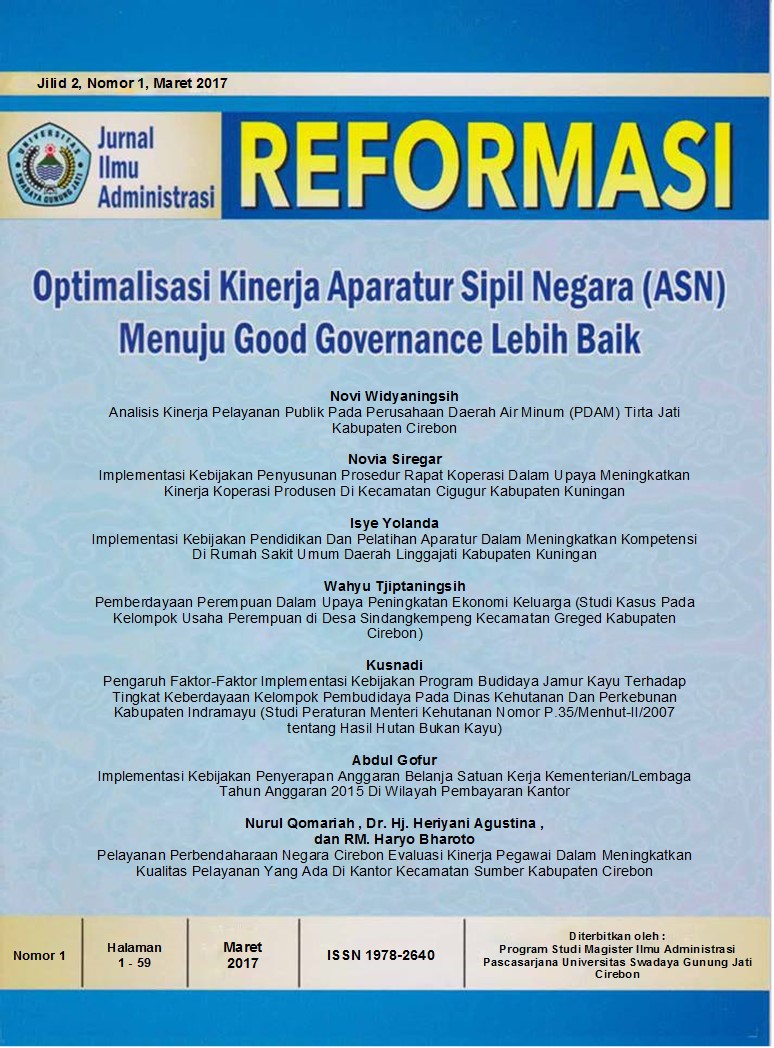PEMBERDAYAAN PEREMPUAN DALAM UPAYA PENINGKATAN EKONOMI KELUARGA (Studi Kasus Pada Kelompok Usaha Perempuan di Desa Sindangkempeng Kecamatan Greged Kabupaten Cirebon)
DOI:
https://doi.org/10.33603/reformasi.v2i1.1451Abstract
This paper emphasizes the implementing of justice and equality between men and women continuously in getting right and opportunity as well as participating benefit action from all results of Indonesia development. One of such developments is in economy aspect. This reality, in fact, tends to discriminate and make economic marginal toward women that causes seriously accomplishment of economic right for them and effects significantly toward family, social, and nation life. Hence, it needs comprehensive study on women economic capabilitty. The goverment, on the other hand, should attempts to develop economic capability for the women.
A kind of research is descriptive qualitative research through case study approach. The purpose of this research is to describe implementation of Driving Team of Empowerment and Family Welfare (PKK) in Empowering Women at Sindangkempeng Residentsof Greged Sub-District, Cirebon District.
The result of research shows that efforts to Driving Team of Empowerment and Family Welfare (PKK) in empowering women have been good to use the analysis of the 5P theory of empowerment. Namely possibility, strengthening, protection, supporting and maintenance. Women's empowerment is aimed to enhance the role of women in community development programs, and also to improve the abilities of women, especially in the economy field. The activities of women’s participation, not only as an extension of their work in reproductive work, but also as an effort to make women being able to have a productive role. Women can contribute to the economic family by providing the active participation in a program that has a goal to improve the family welfare. However, in the women empowerment there are still problems, which is the main actor just come from government and society. The involvement of private will be needed to create better equality and justice of gender.
The recommendation give from this research are Driving Team of Empowerment and Family Welfare (PKK) should work optimally and professionally to have a better life. They should pay a lot of attention in target, and do it constantly. Increase the interaction with women society, giving more intensity to monitoring them.
Â
Keywords: Women Empowerment, Economy, Family WelfareReferences
Daulay, Harmoni. 2006, Pemberdayaan Perempuan: Studi Kasus Pedagang Jamu di Geding Johor Medan, Jurnal Harmoni Sosial, Volume I Nomor I, September, Medan.
Ihromi, TO, 2000, Pokok-pokok Antropologi Budaya, Gramedia, Jakarta.
Komite Penanggulangan Kemiskinan, 2002, Buku Pedoman Komite Penanggulangan Kemiskinan, Sekretariat Komite Penanggulangan Kemiskinan. Jakarta
Moleong, J, Lexy. 2013, Metodologi Penelitian Kualitatif, edisi Revisi, Rosdakarya, Bandung.
Pranarka, A.M.W. & Moeljarto, Vindyandika. 2011, Pemberdayaan (empowerment), dalam Pemberdayaan Konsep Kebijakan dan Implementasi, CSIS : Jakarta.
Sugiyono, 2011, Metode Penelitian Kombinasi (Mix Methods), Alfabeta, Bandung.
Sugiyono, 2013, Memahami Penelitian Kualitatif, Alfabeta, Bandung.
Suharto, Edi, 2014, Membangun Masyarakat Memberdayakan Rakyat Kajian Strategis Pembangunan Kesejahteraan Sosial & Pekerjaan Sosial, Refika Aditama, Bandung.
Sulistiyani, Ambar Teguh, 2004, Kemitraan Dan Model-Model Pemberdayaan, Gava Media, Yogyakarta.
Sumber Lainnya :
Undang-Undang Dasar (UUD) 1945
Instruksi Presiden Nomor 9 tahun 2000 tentang Pengarusutamaan Gender (PUG)
Permendagri Nomor 1 Tahun 2013 tentang Pemberdayaan Masyarakat Melalui Gerakan Pemberdayaan dan Kesejahteraan Keluarga.
BKKBN, 1999, Materi Dasar Pelaksanaan Operasional Gerakan Pembangunan Keluarga Sejahtera, Kantor Menteri Negara Kependudukan/BKKBN, Jakarta.Kabupaten Aceh Tamiang). http://repository.usu.ac.id/bitstream/123456789/7127/1/09E01984.pdf. Diakses 22 Agustus 2016
Suryanto, F. (2003). Implementasi Kebijakan Diklat Teknis di Kabupaten Semarang. http://eprints.undip.ac.id/14838/pdf. Diakses 22 Agustus 2016
Downloads
Published
Issue
Section
License
The Authors submitting a manuscript do so on the understanding that if accepted for publication, copyright of the article shall be assigned to Jurnal REFORMASI, Sekolah Pascasarjana Ilmu Administrasi. Universitas Swadaya Gunung Jati as publisher of the journal. Copyright encompasses rights to reproduce and deliver the article in all form and media, including reprints, photographs, microfilms, and any other similar reproductions, as well as translations.Â
Jurnal REFORMASI, Universitas Swadaya Gunung Jati and the Editors make every effort to ensure that no wrong or misleading data, opinions or statements be published in the journal. In any way, the contents of the articles and advertisements published in Jurnal REFORMASI are the sole responsibility of their respective authors and advertisers.


